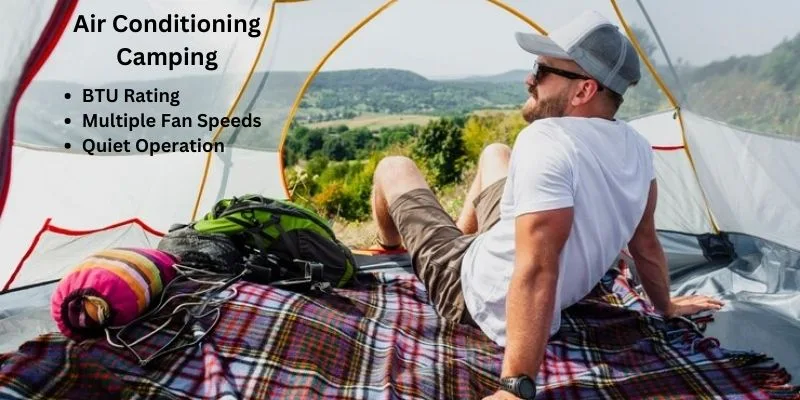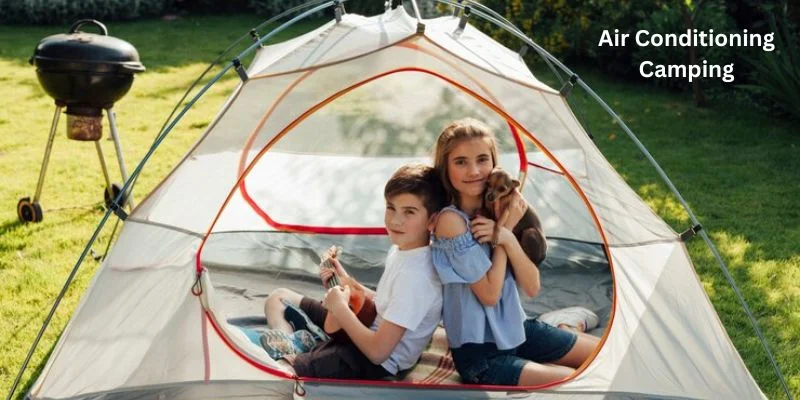Air Conditioning Camping for a Luxurious Outdoor Experience: 5-Star Tent Living
Updated: 19 Aug 2024
230
Love the idea of camping, but not so keen on sleepless nights battling the heat? You’re not alone. Thankfully, there’s a new trend that combines the beauty of the outdoors with the comfort of home: air conditioning camping, also known as glamping with AC and enjoy camping tips for green adventure.
Air conditioning camping is here to revolutionize your outdoor adventures. when you wake up, surrounded by nature’s beauty, without melting under the summer sun. This innovative approach lets you experience the best of both worlds: the thrill of camping and the cool comfort of modern technology. In this article, we step into the concept of air conditioning camping and explore how it’s transforming the outdoor experience into a 5-star affair.
Features of Best Air Conditioning Camping
Here are some of the features to look for in the best air conditioning camping setups.
1. BTU Rating
- This measures cooling capacity. Bigger tents generally need higher BTU (British Thermal Units). For small tents (one to two people), a 5,000 BTU unit might suffice, while larger tents (four or more people) could need 8,000 BTU or more.

2. Multiple Fan Speeds
- This allows you to adjust airflow for comfort and noise level.
3. Quiet Operation
- It’s especially important if you’re looking for a peaceful camping experience. If you are visiting Anastasia State Parking then you should must have Anastasia State Park Camping Map.
4. Temperature Control
- Lets you set your desired temperature for a perfect night’s sleep.
5. Dehumidification Mode
- Can be helpful in humid climates to prevent condensation and musty smells.
6. Remote Control
- Adjust settings from the comfort of your sleeping bag.
7. Generator Compatibility
- Ensure your chosen AC unit works with the wattage of your generator.
8. Solar Compatibility
- Look for models with the option to use solar panels for a more eco-friendly setup (though this might require additional equipment).
9. Easy Setup
- Look for lightweight, portable units that assemble quickly.
10. Window Exhaust Vent
- Ensures hot air is expelled efficiently.
| Remember |
|---|
|
How Camping With Air Conditioning Build?
Camping with air conditioning typically involves the setup of specialized tents or portable air conditioning units designed to provide climate-controlled comfort in outdoor settings.
1. Selection of Equipment
Campers begin by selecting the appropriate air conditioning equipment for their camping trip. This may include portable air conditioners, tent cooling systems, or DIY solutions like swamp coolers or solar-powered fans.
2. Preparation of Tent
If using a tent cooling system or DIY solution, campers prepare their tent by ensuring it’s properly ventilated and insulated. Some tents come with built-in air conditioning capabilities, simplifying the setup process.
3. Installation of Air Conditioning Unit
Campers install the chosen air conditioning unit inside the tent, positioning it strategically to maximize airflow and cooling efficiency. Portable air conditioners may require setting up exhaust hoses or venting systems to expel hot air outside the tent.
4. Power Source
Campers ensure they have a reliable power source to operate the air conditioning unit. This may involve using portable generators, solar panels, or rechargeable batteries, depending on the camping location and duration of the trip.
5. Testing and Adjustment
Once the air conditioning unit is installed and powered on, campers test it to ensure it’s functioning correctly. They may adjust the temperature settings and airflow to achieve the desired level of comfort inside the tent.
6. Maintenance
Throughout the camping trip, campers perform routine maintenance on the air conditioning unit to keep it running smoothly. This may include cleaning filters, checking for any signs of damage, and troubleshooting any issues that arise.
Air Conditioning Camping Vs. Traditional Camping
Air conditioning camping revolutionizes the outdoor experience by offering climate-controlled comfort and nature’s beauty. Contrasting with traditional camping, it brings modern luxury to the wilderness, ensuring a 5-star getaway under the stars. For Free Camping in the United States you must follow the rules and tips. Below, we highlight the key differences between air conditioning camping and traditional camping in a comparative table.
| Aspect | Air Conditioning Camping | Traditional Camping |
|---|---|---|
| Comfort | It is a relatively simpler setup without the need for specialized equipment, although maintenance of camping gear is still necessary. | Relies on natural elements for temperature regulation, which may lead to discomfort during extreme weather. |
| Seasonality | Suitable for year-round camping, allowing campers to enjoy outdoor activities in any season. | Season-dependent, with limitations during extreme heat or cold. |
| Allergy Control | Helps reduce allergens with air filters, providing relief to campers with sensitivities. | May expose campers to outdoor allergens such as pollen and dust, potentially triggering allergies. |
| Setup and Maintenance | Requires setup of air conditioning units and regular maintenance to ensure proper functioning. | Relatively simpler setup without the need for specialized equipment, although maintenance of camping gear is still necessary. |
| Environmental Impact | Consumes electricity, which may contribute to environmental impact unless eco-friendly alternatives are used. | Relies on natural resources with minimal environmental impact, but campfires and waste disposal can impact local ecosystems if not managed properly. |
| Cost | Generally higher initial cost due to the purchase of air conditioning units and associated equipment. | Lower initial cost, primarily consisting of camping gear such as tents, sleeping bags, and cooking supplies. |
Benefits of Air Conditioned Tent Camping
- Comfort and convenience
- Easy set-up and maintenance
- Safety and Security
- Access to remote locations
- Great for families with young children or elderly individuals
- Opportunity for year-round camping
- Combining luxury and nature

Will Air Conditioning Attract Wildlife?
Air conditioning itself wouldn’t directly attract wildlife. However, there are some indirect ways it could influence animal behavior:
1. Water condensation
Air conditioners release condensation as a by product of cooling. In dry environments, this small amount of moisture might attract some insects or small animals seeking hydration.
2. Light and noise
Some AC units, especially older models, can be noisy and emit light. This might deter some wildlife wary of human activity. Conversely, nocturnal animals with good eyesight might be drawn to the light source.
3. Food and shelter
The main draw for wildlife is usually access to food and shelter. If your campsite has leftover food scraps or offers unintentional shelter (like under the AC unit), that might attract animals more than the AC itself.
Safety Tips for Air Conditioned Camping
While air conditioned camping offers a luxurious escape, safety still comes first! Here are some key tips:
- Always ensure your generator is properly ventilated and far from tent flaps to avoid carbon monoxide poisoning.
- Check your AC unit regularly for leaks or damage, and never run it with a wet cord. Since air conditioners can mask dehydration, be sure to drink plenty of fluids throughout the day to stay hydrated.
- Finally, be mindful of electrical safety.
- Avoid overloading circuits and use heavy-duty extension cords rated for your appliance’s amperage.
By following these simple steps, you can relax and enjoy your cool and comfortable air conditioned camping adventure!
Testimonials About Camping With Air Conditioned
“As a sustainability advocate, I was hesitant to try air-conditioned camping at first. But after seeing how eco-friendly these tents can be, I’m a convert!” John, eco-conscious adventurer
Pros and Cons of Air Conditioning Camping
| Pors |
|---|
|
| Cons |
|---|
|
Conclusion
Air-conditioned camping, or “glamping” as it’s often called, isn’t just about escaping the city lights. It’s about redefining the boundaries of outdoor adventure. With a cool, comfortable haven at your fingertips, you can truly immerse yourself in nature without sacrificing a single night of restful sleep. Whether you crave stargazing from a plush king-sized bed or escaping the midday heat for a refreshing afternoon nap, 5-star tent living offers a luxurious escape you won’t soon forget. So, pack your bags, crank up the A/C, and prepare to experience the great outdoors in a whole new light.
FAQs
How does air-conditioning work in a tent?
Air-conditioned tents often use portable AC units that either attach to a special vent in the tent or sit outside with an air duct that leads inside. They require electrical power which may come from a campsite’s electricity hook-up or a portable generator.
Can I use a regular home AC unit for my tent?
A regular home AC unit isn’t typically designed for outdoor use and may be too large and consume too much power for camping purposes. Portable or camping-specific AC units are recommended.
Do all campsites allow air-conditioned camping?
Not all campsites provide the electric hook-ups required for air-conditioned camping. Always check with the campsite in advance regarding their rules and the amenities they offer.
How much does air-camping typically cost?
The cost can vary widely depending on the campsite fees, the price of renting or buying an AC unit, and additional power supply expenses if needed.
Do air-conditioned tents use a lot of energy?
Yes, AC units can use a significant amount of energy. Look for energy-efficient models and be prepared to manage the power supply required for your unit.
Is air-camping environmentally friendly?
While not as eco-friendly as traditional camping due to energy consumption of the AC unit, you can minimize your impact by using solar power, choosing energy-efficient appliances, and adhering to Leave No Trace principles.
What do I need to consider when choosing an air-conditioned tent?
Consider the size of the tent, the efficiency of the AC unit, ease of setup, ventilation, and how you’ll power the AC unit. Also, think about the additional weight and space required for transport.
How do I maintain a comfortable temperature inside the tent?
In addition to using an AC unit, try to pitch your tent in a shaded area, use reflective tarps to deflect heat, and consider tent insulation options to maintain a cool temperature inside.
Please Write Your Comments